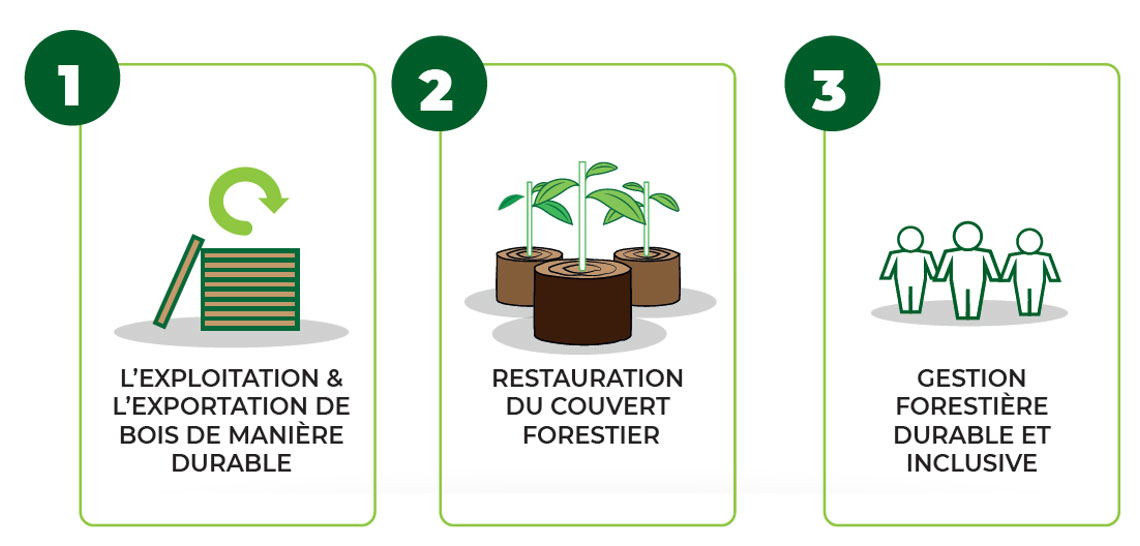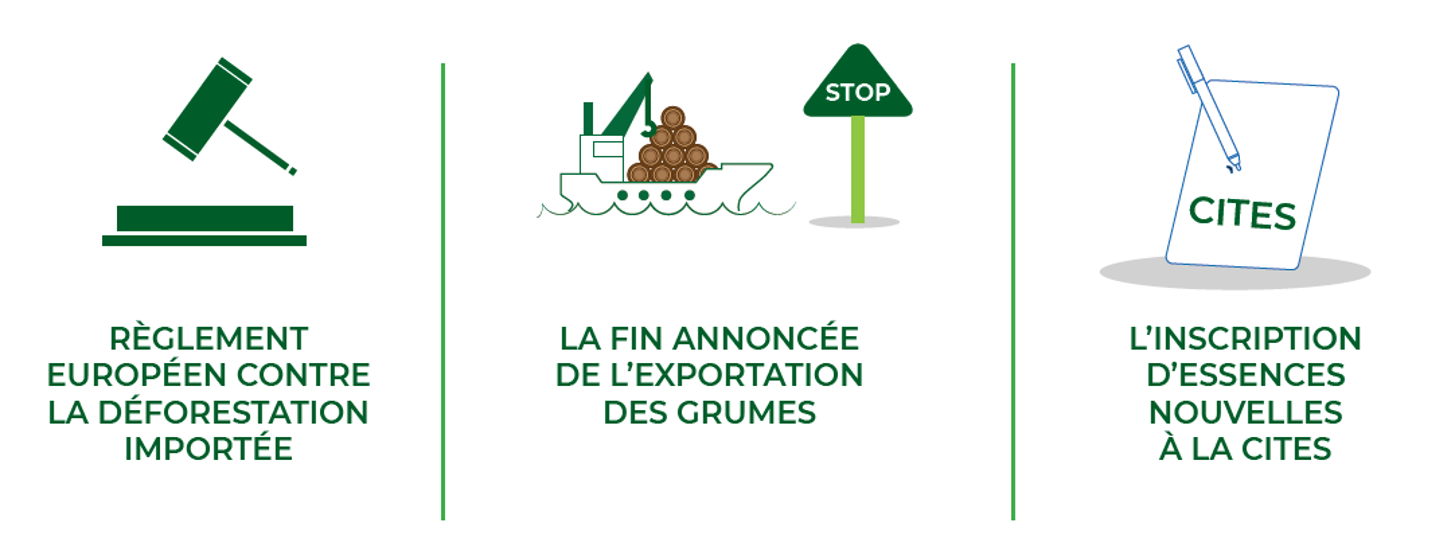


The ASP-Green Deal project is funded by the EU as part of the Programme for Improving Governance in Forestry (PAMFOR).
The aim of the project is to contribute to the development of a green economy, a source of local employment and resilient to climate change. It aims to improve the performance of forest companies and to develop the domestic timber market by directing it towards purchases of sustainable timber.

Cameroon's rainforests fall into two main categories defined by MINFOF as part of the forest zoning process: on the one hand, the permanent forests (the private domain of the State and the Communes, including the FMUs) known as DFP, and on the other hand, the non-permanent forests known as DFnP (including community forests in particular), which are essentially common areas that can still be used for other purposes. There are also around 1 million hectares of community forests (1.5 million with applications) that must comply with a forest management plan. The integration of community forests into the DFP is an issue that could be the subject of a text.
All forest concessions (FMUs), communal forests and most protected areas (Parks, Reserves, ZICs) belong to the permanent forest estate, as long as they are classified, otherwise they are only "proposed" for the DFP. Most FMUs, PAs and communal forests are classified.
These areas, once classified by decree of the PM, are inalienable. For their exploitation or conservation, PFE forests are subject to the preparation of and compliance with a development plan and an environmental and social management plan.
Thus, 6.4 million ha are FMUs devoted to industrial exploitation, of which 3.25 million ha are legally certified and 0.7 million ha are FSC certified (they are beneficiaries of the project).
The private forestry sector in Cameroon is entering a crucial stage for the future of the industry, and there are many challenges to overcome.

Cameroon's forest and timber industry is entering a crucial stage in its future, and there are many challenges to overcome.

The need for ever-better management of the resource, for all forests that have already been exploited at least once, often twice and sometimes even 3 times. We therefore need to encourage the replenishment of exploited stocks, while optimising forest exploitation to make it more efficient by diversifying species and making the most of neglected wood.
Material yields in the forest and in the mills will also have to be improved through better forest performance and diversification of the products manufactured.
In addition to improving performance and yields, the market for Less Known Timber Species (LKTS) will be addressed, as well as opportunities for payments for ecosystem services (carbon, biodiversity). Support projects for zero deforestation agroforestry projects will be studied. In addition, the inclusion of tree species in Annex II of the CITES should be the subject of work to improve interaction with this organisation.
A domestic timber market that should evolve towards the purchase of sustainable timber. The domestic wood market is currently supplied with wood of very diverse quality. Pressure on the resource is high and the socio-economic stakes are high. For the time being, the market has not been structured in such a way as to produce sufficient concrete results, despite the desire to introduce a public policy on wood purchasing. The aim of this policy is to steer the processing industry towards a higher quality of legal and sustainable timber. With the end of log exports, it is essential to find mechanisms that will enable a greater volume of timber to be processed in Cameroon.
A regulatory framework that is increasingly complex, but also undergoing significant change, which must take into account the existing imperatives of the industry, and better integrate the challenges of climate change and sustainable management. The log export ban in the CEMAC zone will be a reality in the short to medium term; companies must adapt and trade associations must strengthen and interact to defend their positions.
CITES recently listed species of the genera Afzelia, Khaya and Pterocarpus in Appendix 2, with the support of the EU.
While Appendix 2 listing does not mean that these species cannot be marketed, it is a de facto brake on exports. Many European marketers will be influenced by such a listing, and will turn away from these species. In addition, Annex 2 classification introduces new requirements for the Ministries in charge of forests (notably the production of Non-Detriment Finding Reports, the setting and monitoring of quotas), requirements that are sometimes difficult to meet due to a lack of human resources. The ATIBT must therefore initiate work to analyse the status of vulnerability and communicate on the actual situation of the species exploited for the 3 genera mentioned above, among others, and also anticipate future positioning, by helping to provide the countries concerned with relevant studies on the resource.
This action also takes into account the new priorities of the EU in Cameroon as described in the Multiannual Indicative Programme (2021-2027), priority area 3 - "Green Pact: sustainable development and action for the climate", to ensure the sustainable development of rural areas, guaranteeing inclusive growth with a balanced exploitation of natural resources. To this end, 2 areas of intervention are prioritised: the preservation of biodiversity and good governance of natural resources, and the adaptation of rural areas to climate change.
A shrinking tropical timber export market, particularly to the EU, but also currently to China. The environmental and social image of tropical timber needs to be improved on the European market, to which Cameroon is exporting more and more processed wood, with increasing added value. The sector initiated positive communication in 2015-2016 and must now strengthen this positive communication and promote certified timber products. Companies involved in the certification process will be able to benefit from support.
The project includes several activities: